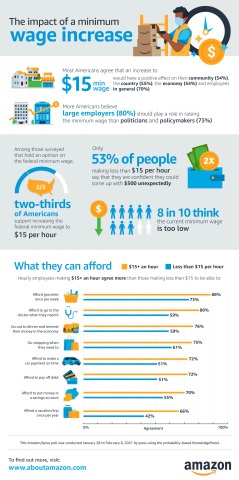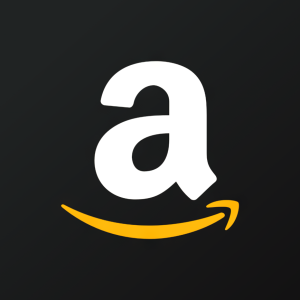New Ipsos Study Finds 8 in 10 Americans Think the Federal Minimum Wage is Too Low and Two-Thirds Support Increasing Minimum Wage to $15 Per Hour
Ipsos' new study reveals that a significant majority of Americans, 80%, believe the federal minimum wage of $7.25 is too low and should be increased to at least $15 per hour. The poll, which surveyed over 6,000 individuals, found that two-thirds support a $15 minimum wage. Many respondents indicated that those earning less than $15 struggle to afford basic necessities. Amazon, having raised its starting wage to $15 in 2018, is highlighted as a leader among large employers advocating for wage increases to enhance employee well-being.
- Amazon's starting wage for U.S. employees is at least $15 an hour, positively impacting over half of its front-line workers.
- The Ipsos study underscores widespread public support (80%) for increasing the federal minimum wage to $15, indicating potential favorable public sentiment towards companies who adopt similar policies.
- None.
Insights
Analyzing...
Today, global market research firm Ipsos released a new, comprehensive federal minimum wage study, which polled more than 6,000 Americans on their knowledge of and opinions on the current federal minimum wage of

Amazon - Ipsos
In 2018, Amazon raised its starting wage for all U.S. employees to at least
The findings in this study reveal a widely held view that the current amount of
-
Eight in ten Americans (
80% ) say the federal minimum wage is too low. This consensus was seen across all genders, generations, education levels, races, income levels, and regions of the country. -
Among those surveyed who hold an opinion on the federal minimum wage, two-thirds support increasing it to
$15 per hour. Even when including undecided respondents on the matter, more than half (56% ) support a$15 per hour minimum wage. -
The majority of Americans also believe raising the minimum wage would have a positive impact on employees in general (
70% ), the country (55% ), their community (54% ), and the economy (54% ).
“Virtually any policy discussion today devolves into partisan debates and experts talking past each other,” said Chris Jackson, Senior Vice President of Public Affairs at Ipsos. “Rarely, if ever, do the opinions or preferences of regular Americans enter into these debates, but our study clearly indicates that the American people want to see the federal minimum wage increased. This level of agreement is practically unheard of in contemporary America and reflects an overwhelming public consensus that elected officials should think twice before disputing.”
The Real Impact of a
About two in five hourly, temporary, or seasonal employees say they make less than
-
Increasing the federal minimum wage to
$15 an hour would have a significant impact on those currently making less than that amount. About one in four people currently earning$15 an hour or more say that at some point in the past five years, they have earned less than$15 an hour (24% ). When they compare what they could afford before their income increased versus now, this group is significantly more likely to say they can afford necessities, such as groceries (a15% increase), going to the doctor (a20% increase), and prescription drugs (a19% increase). -
People making less than
$15 are significantly more likely to say they are spending more than they make (26% compared to17% of those making$15 or more, and10% of salaried employees) and more likely to say they pay most of their household bills late (17% compared to5% of those making$15 or more and2% of salaried employees). -
Those making less than
$15 an hour are twice as likely to say they are not confident they could come up with$500 if an unexpected need came up in the next month (30% ) compared to those making$15 or more (16% ).
The Role & Responsibility of Large Businesses in Increasing the Minimum Wage
When compared to politicians and policymakers (
Amazon’s 2018 decision to increase starting wages to at least
“Where I worked before Amazon, I made
Stories like Kimberly’s are why Amazon, as one of the nation’s largest employers, continues to encourage other large companies to raise their wages and to advocate for members of Congress to raise the minimum wage.
“We believe that
Amazon’s minimum wage comes on top of comprehensive benefits like healthcare, 401(k) company matching, and paid parental leave. In addition, Amazon employees can access a wide range of free training programs to learn new skills for in-demand jobs as part of Upskilling 2025–a
For more on the study, and to see the stories of people who have experienced the benefits of a
Methodology
This Amazon/Ipsos poll was conducted January 28 to February 8, 2021 by Ipsos using the probability-based KnowledgePanel. This poll is based on a nationally representative probability sample of 6,354 with a boost for hourly workers and state boosts in Florida, Minnesota, Washington, Arizona, Georgia. The survey was conducted in English and Spanish.
KnowledgePanel is the largest and most well-established online probability-based panel that is representative of the adult US population. Our recruitment process employs a scientifically developed addressed-based sampling methodology using the latest Delivery Sequence File of the USPS – a database with full coverage of all delivery points in the US. Households invited to join the panel are randomly selected from all available households in the U.S. Persons in the sampled households are invited to join and participate in the panel. Those selected who do not already have internet access are provided a tablet and internet connection at no cost to the panel member. Those who join the panel and who are selected to participate in a survey are sent a unique password-protected log-in used to complete surveys online. As a result of our recruitment and sampling methodologies, samples from KnowledgePanel cover all households regardless of their phone or internet status and findings can be reported with a margin of sampling error and projected to the general population.
The data were weighted to adjust for gender by age, race/ethnicity, education, Census region, metropolitan status, household income, and party identification. The demographic benchmarks came from 2019 American Community Survey (ACS) from the US Census Bureau.
– Gender (Male, Female) by Age (18–29, 30–44, 45–59, and 60+)
– Race/Ethnicity (White Non-Hispanic, Black Non-Hispanic, Other or 2+ Races Non-Hispanic, Hispanic)
– Education (High School graduate or less, Some College, Bachelor and beyond)
– Census Region (Northeast, Midwest, South, West)
– Metropolitan status (Metro, non-Metro)
– Household Income (Under
– Party ID (Democrat, Republican, Independent, Something else)
About Amazon
Amazon (NASDAQ:AMZN) is guided by four principles: customer obsession rather than competitor focus, passion for invention, commitment to operational excellence, and long-term thinking. Customer reviews, 1-Click shopping, personalized recommendations, Prime, Fulfillment by Amazon, AWS, Kindle Direct Publishing, Kindle, Fire tablets, Fire TV, Amazon Echo, and Alexa are some of the products and services pioneered by Amazon. For more information, visit amazon.com/about and follow @AmazonNews.
About Ipsos
Ipsos is the world’s third largest Insights and Analytics company, present in 90 markets and employing more than 18,000 people. Our passionately curious research professionals, analysts and scientists have built unique multi-specialist capabilities that provide true understanding and powerful insights into the actions, opinions and motivations of citizens, consumers, patients, customers or employees. We serve more than 5000 clients across the world with 75 business solutions. ISIN code FR0000073298, Reuters ISOS.PA, Bloomberg IPS:FP www.ipsos.com.
View source version on businesswire.com: https://www.businesswire.com/news/home/20210316005362/en/







